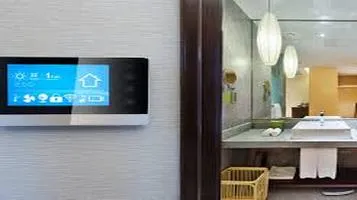A Comprehensive Review of Smart Thermostats: The Future of Home Climate Control
Smart thermostats are advanced devices designed to optimize home heating and cooling systems for improved energy efficiency and convenience. Unlike traditional thermostats, smart versions connect to the internet, allowing users to control their home climate remotely via smartphones, tablets, or smart home systems. They adapt to homeowners' schedules by learning daily routines, adjusting temperatures automatically to save energy when nobody is home, and ensuring comfort upon return. Many smart thermostats feature compatibility with voice assistants like Amazon Alexa, Google Assistant, or Apple Siri, enabling hands-free control. Additionally, they often provide detailed energy usage reports, helping users monitor consumption and identify savings opportunities. By combining technology, convenience, and sustainability, smart thermostats offer both comfort and efficiency, making them a popular choice for modern homes.

In the era of smart homes and connected devices, smart thermostats have emerged as a game-changer in the realm of home climate control. These advanced devices not only promise to enhance comfort and convenience but also offer significant energy savings and sustainability benefits. As more homeowners seek out intelligent solutions for their living spaces, smart thermostats have become an essential component of modern home automation systems. In this review, we'll delve into the features, benefits, and considerations of smart thermostats, offering a comprehensive overview of their role in contemporary homes.
Features and Functionality
Smart thermostats are designed to learn your schedule and preferences, making automatic adjustments to maintain optimal temperature settings throughout the day. One of the standout features of these devices is their ability to be controlled remotely via smartphone apps. Whether you're at work, on vacation, or simply lounging on the couch, you can adjust your home's temperature with a few taps on your phone. This remote control functionality not only adds a layer of convenience but also ensures that you never return to an uncomfortably hot or cold home.
Another key feature is the integration with other smart home systems, such as Amazon Alexa, Google Assistant, and Apple HomeKit. This allows for voice-activated commands, making it even easier to adjust your thermostat settings. For instance, you can say, "Alexa, set the living room temperature to 72 degrees," and your smart thermostat will comply without you having to lift a finger.
Energy monitoring is another significant aspect of smart thermostats. Many models offer detailed reports on energy usage, providing insights into how your heating and cooling habits impact your energy bills. Some even offer tips and suggestions for improving energy efficiency, helping you to reduce your carbon footprint and save money in the long run.
Benefits
The primary benefit of smart thermostats lies in their ability to save energy and reduce utility costs. According to various studies, homeowners can save up to 10-12% on heating and 15% on cooling bills by switching to a smart thermostat. These savings can add up significantly over time, making the initial investment in a smart thermostat well worth it.
Comfort is another major advantage. Traditional thermostats require manual adjustments and often lead to inconsistent temperature settings. Smart thermostats, on the other hand, learn your preferences and adjust automatically, ensuring that your home is always at the ideal temperature. This is particularly beneficial for families with varying schedules, as the thermostat can adapt to different routines seamlessly.
The ability to control your thermostat remotely is not just a convenience but also a safety feature. For instance, if you forgot to turn off the heating before leaving for a vacation, you can easily do so from your smartphone, preventing unnecessary energy consumption and potential safety hazards.
Considerations
While smart thermostats offer numerous advantages, there are some considerations to keep in mind. The initial cost of these devices can be higher than traditional thermostats, with prices ranging from $100 to $300 or more. However, the long-term energy savings often offset this initial investment.
Installation can also be a consideration. While many smart thermostats are designed for easy DIY installation, some older HVAC systems may require professional installation to ensure compatibility and optimal performance. It’s essential to check your existing system’s compatibility before purchasing a smart thermostat.
Privacy and security are other factors to consider. Since smart thermostats are connected to the internet, they can be vulnerable to hacking if not properly secured. It's crucial to use strong passwords and keep your device’s firmware updated to protect against potential security threats.
Popular Models
Several smart thermostat models stand out in the market, each offering a unique set of features.
1. Nest Learning Thermostat: One of the pioneers in the smart thermostat market, the Nest Learning Thermostat is known for its sleek design and intuitive learning capabilities. It automatically adjusts to your schedule and offers energy usage reports.
2. Ecobee SmartThermostat: This model comes with a built-in Alexa speaker, allowing for voice commands and playing music directly from the thermostat. It also includes remote sensors to ensure consistent temperature throughout the house.
3. Honeywell Home T9: The Honeywell T9 offers robust compatibility with various HVAC systems and features remote sensors for better temperature control in different rooms. It also integrates well with major smart home ecosystems.
4. Emerson Sensi Touch: Known for its affordability and ease of use, the Emerson Sensi Touch offers a user-friendly interface and compatibility with most smart home systems.
Conclusion
Smart thermostats represent a significant advancement in home climate control, blending convenience, energy efficiency, and modern technology. While the initial cost and installation considerations may pose a barrier for some, the long-term benefits in terms of energy savings, comfort, and integration with other smart home devices make them a worthwhile investment. As technology continues to evolve, smart thermostats are likely to become even more integral to our living spaces, paving the way for smarter, more sustainable homes. Whether you're a tech enthusiast or simply looking to reduce your energy bills, a smart thermostat is a valuable addition to any contemporary home.






